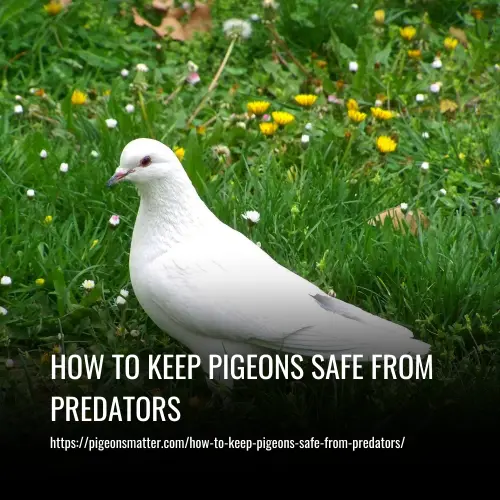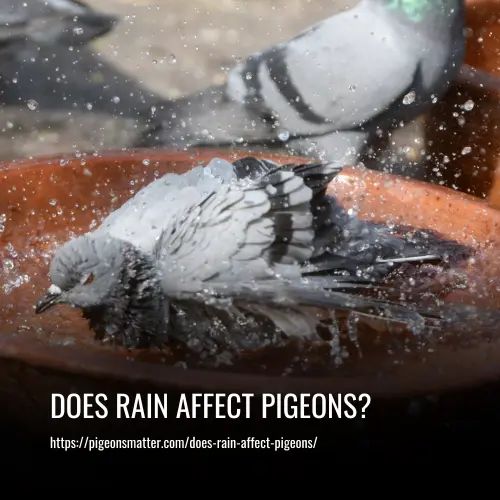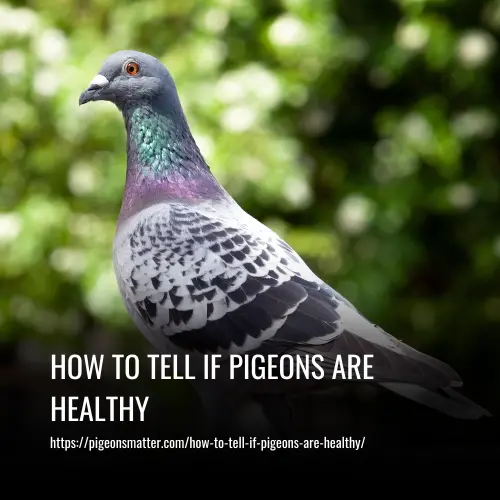Pigeons are common birds found in urban and suburban areas, often coexisting with humans. However, they are also vulnerable to predators, making it crucial for bird lovers and pet owners to take measures to keep them safe.
To Keep Pigeons Safe From Predators, Follow These Steps:
- 1. Minimize Access to Pigeons
- 2. Adopt a Puppy
- 3. Use Repellents

How to Keep Pigeons Safe from Predators
To protect your pigeons from predators, there are a few strategies you can employ:
1. Minimize Access to Pigeons
Limiting access to the roof or area where the pigeon cage is located can help prevent cats or other predators from reaching the birds. Keep doors closed and make it difficult for predators to jump onto the roof from neighboring areas.
2. Adopt a Puppy
Having a dog around pigeons can create a bond and provide protection. As the puppy grows up, it will see the pigeons as part of its territory and may defend them against threats. Dogs can be effective in deterring predators and keeping pigeons safe.
3. Use Repellents
Research specific repellents that deter the predators in your area. For example, scents like orange, lemon, lavender, and mint can repel cats, while reflective deterrents like CDs or mirrors can scare away hawks. Use these methods strategically to keep predators at bay.
By implementing these strategies, pigeon owners can help ensure the safety and well-being of their birds.
Common Pigeon Predators
Pigeons have several natural predators that pose a threat to their safety. It’s important for pigeon owners to be aware of these predators and take measures to protect their birds.
1. Hawks
Hawks are a common predator of pigeons and other smaller birds. They have the advantage of size, speed, and natural hunting instincts. Pigeons are no match for hawks in terms of strength and agility. If a hawk spots a pigeon in the sky, it will easily catch and attack it.
2. Shikra
Shikra, also known as the little banded goshawk, is another bird of prey that preys on pigeons. They are found in Asia and Africa and are known for targeting sparrows and pigeons. While they are smaller in size compared to hawks, pigeons are still afraid of them and can fall victim to their attacks.
3. Cats
Cats are skilled predators with instincts similar to lions and tigers. They can silently approach and chase their prey, making it easy for them to capture pigeons. Pigeons are especially vulnerable when they are sitting on their eggs, as cats can easily enter the pigeon cage and capture them.
4. Crows
While crows are not typically aggressive towards pigeons, they can still pose a threat. A group of crows may chase and potentially harm a pigeon. Additionally, crows have been known to steal pigeon eggs or young chicks from their nests. However, crows are less likely to attack pigeons if there are humans or dogs nearby.
It’s important for pigeon owners to be vigilant and take steps to protect their birds from these predators. This can include providing secure housing, keeping a watchful eye on the surroundings, and implementing deterrents to keep predators away from the pigeons.
Tips To Keep Pigeons Happy And Safe
Pigeons need specific care and attention to ensure their happiness and safety. Here are some tips to keep them well cared for.
1. Provide a Safe and Comfortable Shelter
Pigeons need a safe and comfortable shelter, such as a well-ventilated pigeon coop or loft, that is clean and free from predators.
2. Provide Regular Food and Water
Regular clean water and pigeon feed from pet stores are essential for maintaining a healthy diet. Keep feeding and watering areas clean to prevent contamination.
3. Create a Nesting Area
Pigeons require a place to lay their eggs and raise their young. Provide nesting boxes or shelves within their shelter, keeping the area clean and predator-free.
4. Offer a Bathing Area
Pigeons enjoy washing and staying clean. Provide a shallow water dish or birdbath within their shelter for them to bathe.
5. Protect from Predators
Pigeons are prey to predators such as cats, hawks, and owls, so it’s crucial to keep their shelter secure and avoid areas where predators are likely present.
6. Encourage Social Interaction
Pigeons are social birds that enjoy the company of their own kind. Consider keeping more than one pigeon together to provide social interaction and companionship.
By following these tips, you can keep your pigeons happy, healthy, and safe.
FAQs
You can keep pigeons safe from predators by providing secure housing, such as a coop or aviary, using scare tactics like decoys or noise makers, and keeping the area around their housing free of hiding spots for predators.
Pigeons are scared of loud noises, bright lights, shiny or reflective objects, and fake predators or scarecrows. These things can make them feel threatened and deter them from an area.
Falcons, especially the Peregrine Falcon, Cooper’s Hawks, and Goshawks, are known to hunt and kill pigeons. However, any large raptor that comes across a pigeon may seize the opportunity to make a meal out of it.
Pigeons fear hawks the most. Hawks like Peregrine Falcons and the Harris Hawk are natural predators to pigeons. Pest control hawks are trained to mimic their hunting behavior in urban and industrial areas, flying from perch to perch. This exploits the pigeons’ instinctive fear and helps control their population.
To protect pigeons from hawks, you can use mirrored balls or CDs that reflect light and scare hawks away. However, it’s important to periodically change the model because hawks can learn that it’s not a threat. If you see a hawk near your pigeons, you can use a whistle or make a noise to scare it away. Additionally, removing trees and bushes close to the loft can help deter hawks.
To protect pigeons from eagles, hawks, and falcons, you can use a product called hawk shield gel. Apply one drop of the gel to the pigeon’s head, wings, legs, and tail before flying them in the morning. This gel provides protection for up to 16 hours and does not have any adverse effects on the pigeon or its flying abilities.
Yes, installing fencing around the area where pigeons are kept can help protect them from predators. Make sure the fencing is secure and has no gaps where predators could enter.
It is crucial to keep pigeons safe from predators to ensure their well-being and prevent unnecessary stress or harm.
If you suspect a predator is targeting your pigeons, take immediate action by securing their housing, removing any potential food sources for the predator, and seeking professional help if necessary.
You can use natural deterrents such as motion-activated sprinklers, reflective objects, and predator scent deterrents to ward off potential threats to pigeons.
To protect pigeons from aerial predators, you can use lightweight netting or wire mesh to cover the top of their enclosure and prevent birds of prey from swooping in.
Yes, installing motion-activated lights or keeping the area well-lit at night can help deter nocturnal predators from preying on pigeons.
In urban environments, it’s important to ensure that pigeons have a safe, enclosed area to roost and that any potential entry points for predators are secure. Additionally, be mindful of any nearby feral animals that may pose a threat to pigeons.
To keep pigeons safe from predators in your backyard, you can install a bird feeder with a cover, provide hiding spots like bushes or trees, and use scare tactics such as decoy predators or noise-making devices.
You can use natural deterrents such as citrus peels, garlic, or peppermint oil around the pigeon’s habitat to repel predators. These scents are known to be disliked by many predators.
It is not recommended to use traps or poisons to keep predators away from your pigeons, as these methods can harm non-target animals and disrupt the natural ecosystem.
You can create a balanced and natural habitat for pigeons while coexisting with natural predators by implementing deterrents and providing safe spaces for pigeons to escape from predators. This will allow you to maintain a healthy ecosystem while keeping your pigeons safe.
Conclusion
In conclusion, keeping pigeons safe from predators is essential for their well-being and survival. By implementing effective strategies such as providing a secure and enclosed shelter, using deterrents to keep predators away, and being vigilant and proactive in monitoring their environment, pigeon owners can help ensure the safety of their flock.
It’s also important to remember that prevention is key, and taking the necessary precautions can go a long way in protecting pigeons from harm. Ultimately, by prioritizing their safety and taking the appropriate measures, pigeon owners can create a secure and comfortable environment for their birds to thrive.


